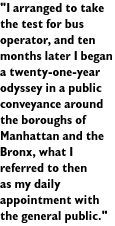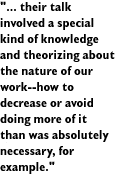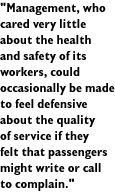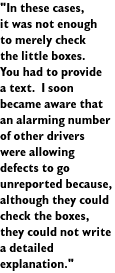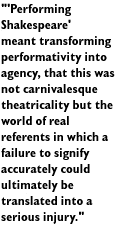

Writing and Literacy on the Job
|
1. I became a graduate student in the Ph.D. program in English at the City University of New York (CUNY) in the fall of 1993. One year later, on September 22, 1994, I retired from the New York City Transit Authority after working for twenty-one years as a bus driver in Manhattan and the Bronx. I was born and raised in Brooklyn, New York in what was then an Italian-American working-class neighborhood. That neighborhood is now an ethnic crossroads of sorts and, appropriately, I find myself at a professional and pedagogical crossroads. 2. I was the first in my family to attend college and followed a path well-trodden by thousands of other working-class youth through the gates of Fordham University's Rose Hill Campus. A degree from this institution, I had been told (and I believed it implicitly), was a passport out of the working class. To make a long story short, it didn't work out that way. After college, I held a long series of jobs for which I was eminently overqualified: cab driver, truck driver for an industrial laundry, and driver for Dannon Yogurt, only the most prominent among them. Eventually, I was given a copy of The Chief, a newspaper containing announcements of competitive tests for civil service jobs in New York City. I arranged to take the test for bus operator, and ten months later I began a twenty-one-year odyssey in a public conveyance around the boroughs of Manhattan and the Bronx, what I referred to then as my daily appointment with the general public. 3. From the start I was marked as.somehow different although I was by no mean the only college graduate. In fact, I came to discover that a surprising number of my co-workers had some college experience. What was surprising to me then is now unremarkable as I talk among and read the texts of my own predominantly working-class students at Lehman College, CUNY. As is true for these students now, a principal marker of that difference was an attempt to build a life based upon reading and writing. Since I was a college graduate, a former political activist in SDS (Students for a Democratic Society) against the Vietnam War and a variety of anti-racist, pro-working class campaigns on campus and off, literacy had been for me a natural and customary practice for which there was a ready and demonstrable purpose. Literacy skills were inseparable from a definition of oneself as an active human agent; to claim agency required one to put a variety of literacy skills to the test of public discourse and political action. But I had drifted away from political activism. On this job, my voracious and uninterrupted reading marked me as awkwardly "bookish." 4. My co-workers had other pastimes: playing cards, billiards, and checkers while talking shit and telling lies in the drivers' "swing" room (a lunchroom cum recreational area). I was not a cardplayer, but by shooting pool I dissipated some of the awkwardness and built friendships. I learned to talk shit and "signify" with the best of them. But my co-workers continued to shake their heads in disapproval when they caught me with my head inside The New York Times. To their way of think ing, any inordinate display of interest in books or newspapers was taboo. It made you solitary and took you away from the group and group-talk. More importantly, their talk involved a special kind of knowledge and theorizing about the nature of our work--how to decrease or avoid doing more of it than was absolutely necessary, for example. This was hard because bus drivers are monitored by three kinds of supervisors: those at the depot itself, those who tally buses from stationary posts on the road, and the mobile kind who would check drivers from Transit Authority vehicles. I was keenly aware of this difference between me and my co-workers, and I was anxious to diminish it. 5. Nevertheless, while at work I read at every opportunity. At meals in the depot. In between games of pool. In the few minutes between trips at the end of the line. Even at the red lights. Today, I wish I had a dollar bill for every passenger who called out to me, "Excuse me driver, but the light is green." They were not always that polite. I would look up sheepishly from the newspaper, see the large green eye staring down at me, and continue the trip. One constant on this job was the way in which bus drivers always viewed the end of the line as a refuge. For some it meant a brief stroll in the sunshine, for others, a quick smoke. For me, the end of the line represented the opportunity to snatch a few minutes of solitude with my feet up and my head inside a book or newspaper. 6. What was I was reading in all these unusual places? I can assure you that I had no canon. I indulged a variety of interests: music, politics, history, literature, sports. I remember Aaron Copland's What to Listen For in Music; Robert Palmer's wonderful Deep Blues, a history of the evolution of Delta blues into modern rock and roll; a history of scientific racism, The Legacy of Malthus by Alan Chase (at 700 pages, a bit heavy to lug around all day); Jayne Anne Philips's novel Machine Dreams; B. Traven's jungle trilogy, March to the Monteria, The Rebellion of the Hanged, The General from the Jungle, and his Death Ship; Truman Capote's In Cold Blood; virtually all of Raymond Chandler and Dashiell Hammett; Lillian Hellman's memoirs. And always my trusty New York Times, large enough to conceal the average-sized paperback and a wad of bus transfers, useful enough to double as a fly swatter or (when properly folded) a weapon or even a seat cushion in an emergency. 7. But, ultimately, this fascination and facility with texts had more serious consequences. Eventually, I came to be affectionately known among some of my co-workers as "Shakespeare." I earned this nickname as the result of my determination to exhaust the textual possibilities on the formatted, pre-printed, and multiple-copy defect cards bus drivers were obligated to fill out when returning a bus to the depot, either according to a regular schedule or if the bus had some defect and needed to be taken out of service. The printed card was filled with many little boxes to be checked off indicating categories and types of defects: hot engine, defective brakes, broken grab rails inside the bus, broken glass, defective windshield wipers, gasoline or battery fumes, no heat, etc. You could always start an argument with a foreman by complaining that a bus had a defective front end. That meant that the front suspension was so weak it could no longer cushion the pounding from the cratered New York City streets. These buses were known as "kidney busters." 8. One had always to be very careful of phrasing when filling out the defect cards; the message had to be mediated by a knowledge of one's audience and a feel for how to best convey one's intention. No matter now valid the particular defect or how legitimate the claim to pain and/or injury on the part of the driver, if you announced as part of the record of the defect that passengers had been complaining (or better yet, had instigated the complaint), they might take the bus off the road and check the problem. For example, with the notorious defective front end suspension, if you complained that you could no longer stand the pounding and your back and kidneys were hurting, you were likely to be met by skepticism and an argument: "We pay you to drive a bus. If you want to go on disability or workers' compensation, fill out the papers." The point was that management, who cared very little about the health and safety of its workers, could occasionally be made to feel defensive about the quality of service if they felt that passengers might write or call to complain about inadequate service or potentially dangerous buses. 9. I tried to inform as many of my co-workers as I could that one solution to this problem was to write and write and write all over the defect card, providing excessive detail, so that the bosses would think twice about allowing a defective vehicle out on the road. In fact, a maintenance foreman might explicitly request detailed information about a specific defect. In these cases, it was not enough to merely check the little boxes. You had to provide a text. I soon became aware that an alarming number of other drivers were allowing defects to go unreported because, although they could check the boxes, they could not write a detailed explanation. They could not provide a text which summarized, compared and contrasted, argued, defined, described, or provided a narrative about a particular defective bus. Their lack of proficiency in the world of texts created the risk and danger that other workers and passengers would be exposed to dangerous and unsafe conditions. They were powerless to write, to leave the paper trail required by the system. This how I came to understand that "performing Shakespeare" meant transforming performativity into agency, that this was not carnivalesque theatricality but the world of real referents in which a failure to signify accurately could ultimately be translated into a serious injury or accident, heart disease or high-blood pressure, kidney or lung damage, or a host of other occupational hazards too numerous to mention. 10. At first, other workers would poke fun at my long and involved descriptions filling entire defect cards and often spilling over onto the reverse side. Because I occasionally served as a line steward for our union, Local 100 of the Transport Workers Union (TWU), I was concerned about removing defective equipment from passenger service. The bosses and some other workers might ridicule my defaced defect cards, but the reality was that, because of my facility with texts, I never had to keep a defective bus on the road or feel that I had endangered a co-worker or passenger. After some time on the job, I would frequently be approached by other drivers and offer to assist them in writing these explanations, but that hardly altered what was a pattern inside the entire industry. Looking back on this experience, I see that I was engaged in an effort to enact among my co-workers a rhetoric of resistance and empowerment in providing texts to confront authority. This continues to be my model and goal in the writing classroom. 11. Today, I see this phenomenon repeated in the experience of my own students, and I want to offer now a comparison between my recent students and my former co-workers. In an essay entitled "Why Go to College," a student in one of my Composition classes a couple of years ago wrote about the sense of dislocation and doubt that were the framing context of her college experience. (I have attempted to accurately reproduce the surface level variants from Standard Edited English that mark her discourse.) She writes: "I have been taught education is the key. I think without education some of the doors get shut, that would not have been shut, if you had your education. I did not always believe this. I just wanted to finish high school, get my diploma, and get school over with. I did not even think of educating myself any further. I started to think what was i going to do with my life. What were the opportunities that i had, what goals were i striving for, my outcome was nothing." This student is clearly facing the probability of diminished opportunities and possibilities without a college education and is resolved to get her diploma. Later, her commitment wavers as she comes to identify herself as outside the discourse of the academy:"I started thinking about different things and different ways to get around going to college, but nothing came up...Now that i am in college, getting that education that i was only told i needed to get ahead things are just a little different...things seem a little difficult to me. I find it very hard to manage all my classes. They all have different things that need to be done, and they ask a lot from you." Here, we can hear the beginnings of doubt as the student considers the possibility that she may not be able to cope with the world of college, the work it asks of her, and the discourse it requires. 12. The mood of her text varies radically from this point as she attempts to articulate her diffidence about her school work and as she creates a new, less optimistic text. She writes: "I do not think i am going to last very long in college. I do not know if this is because of my dislike in school experience or if i am being plain lazy. Everybody is telling me you can do it, you can do it, but they are not in my shoes...i just find college to be too HARD. If i were to find a good paying job at this moment i would leave college in a hurry. But then i hear all of these success stories and i say to my self that's going to be me. I know i can really do it if I try, but the energy is not there. I am trying though, but i do not think i am going to make it...I know education is the way to go, but i just can not digest this for my well being. Maybe someone will bring it to light for me because i am lost." My attempt to respond to this student represents for me a powerful replication of my struggle with my co-workers in the bus depot, trying to convince them of the importance of not surrendering to their own fears about texts and the work involved in producing them and submitting them for judgment. 13. This student's assimilation anxiety about the college experience, the work it entails, the language spoken there, and about her own inherent ability are all powerful reminders that dominant institutional discourses are prone to shut off conversation, debate, interrogation, and investigation when they identify potential oppositional discourses. The protocols of academic discourse cannot accommodate her language; her discourse is "other" because her language is incomprehensible according to the rules and formulas of the academy. Carol Deletiner, in her article "Crossing Lines," has reminded us of the necessity of crossing and eradicating boundaries to establish common ground with our students.[1] This may require a new language, a language politically aware enough to accommodate and focus what Henry Giroux and Ira Shor have described, respectively, as "negative resistance"[2] and "student non-performance."[3] 14. These issues raise for me a number of questions. What is the language appropriate both for articulating grievances on the job and for English Composition? One appropriate for transforming negative resistance into intellectual curiosity and informed agency? Is there or should there be one? These questions beg another: what is the purpose of Composition? How do we imagine or re-imagine higher education? Does the Composition class contain within it an inherent politics of domestication of working-class frustration? Does it ask working-class students to suppress their class identities? My former co-workers naming me "Shakespeare" and my literacy performance are emblematic of the problematic relationship between public perceptions of what writing is good for and the efficacy of writing as a tool to change social reality. If the language of English Composition is useless for the day-to-day purposes of working-class students, if they cannot use it to critically examine their own lives, their sense of confusion and dislocation within the academy, their need to evaluate received wisdom, then we are creating a barrier between ourselves and students. Perhaps a rhetoric of agency requires a different language, or at least a different and more flexible dialect. 15. I want to spark within my students a rhetoric flexible enough so that they may use it to creatively examine the conditions of daily life, to understand the sources of their own dislocation and discomfort on the job and in their communities, and to make them active agents for change both inside and outside academy. I am looking for an appropriate language. For the time being, I background questions of grammar allow them to make the formulaic concerns of academic discourse secondary. I want and allow them to write from a sense of passion and commitment, from what Richard Ohmann defined in English in America as a "compelling interest."[4] I apply to these students the same principles I did when I was "Shakespeare" in the bus depot. Identify the topic or theme (the defect), know the relevant sources (history of the equipment), interrogate received wisdom (never take at face value anything the boss may tell you), and pinpoint your audience (the relevant supervisor). In both cases, my job is to transform a rhetoric of silence and compliance into a rhetoric of voice and agency. 16. Today, nearly everyone I know is anxious to congratulate me on finally getting out of the working class, on my good fortune in ascending the social ladder. I remember the old parody of the song, "The People's Flag," the anthem of the British Labor Party. The original lyric is as follows: "The people's flag is deepest red / It shroudeth o'er our martyred dead..." The parody goes: "The working class can kiss my ass / I've got the foreman's job at last!" Ironically, now that I am progressing toward the doctoral degree and all the social markers of rank and status that accompany it, I find that I am headed, at least in a pedagogical sense, in the other direction, back into the working class. At my worst moments, I worry about to what extent my students and I reflect back to one another our own "Others." I am their "other," the symbol of possibility, of making it out of working class, the living embodiment of textual authority and bureaucratic dominance. They represent to me, increasingly, my own sense of "other," i.e., my other self, my old self. I want to embrace them, but I vacillate. I am bothered by the fear that I am indulging a romantic dream. Can I wear two hats at once? Develop myself as a working-class intellectual? Rise with my class and not above it? Push them up from below and not reach down from above with missionary zeal? 17. In conclusion, I suppose I am suggesting a reformulation of our conception of a critical pedagogy for the academy. I see it as my business to provide practical but academically rigorous outlets for the all-too-often isolated skills of critical reading and writing. I want my students to write more interesting, complex, and elegant papers for their classes, but I also want them to use those skills to "read and write the world" as active agents of social change. To do this, they must feel that the writing class is a place in which they can explore their own class experience and tell their own stories in a language that is both competent and appropriate. However, these binaries cannot remain uninterrogated: complex and elegant vs. practical skills and agency. I invite my students to examine language in critical ways, challenging them to look at how subjectivity is socially constructed, but also at how they can reconstruct themselves. Language is a powerful ideological tool, but the writing classroom can open windows on voice and agency that, perhaps, my working-class students have not imagined. Although I fear to fail, I fear passivity and docility even more. So, I continue to "perform" Shakespeare on the job, acting as facilitator and "agitator" of as yet unimagined discourses to tell stories about experiences unrelated to the replication of a professional and managerial class. My bus won't go there.
Leo Parascondola, City University of New York 
|
by Leo Parascondola
|
